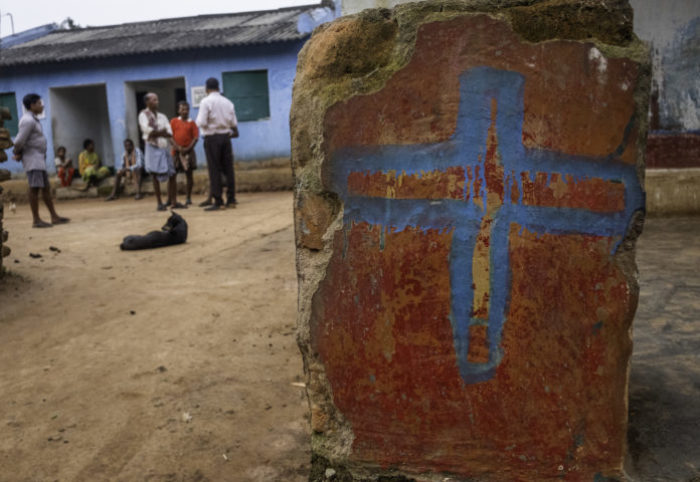
Hindu right-wing organizations in Chhattisgarh’s Kanker district have intensified their campaign against Christian communities, with two tribal villages banning the entry of Christian pastors and priests, while protesters presented an 11-point memorandum demanding government action during a demonstration last Tuesday.
The Sanatan Samaj (Eternal Society) organized a day-long demonstration in Bhanupratappur that resulted in a complete shutdown of commercial establishments. The protest targeted Christian religious activities and demanded restrictions that would effectively deny Christians their constitutional rights to religious freedom and movement.
Two villages in the Bhanupratappur block, Kudal and Junwani, have passed gram sabha (village council) resolutions prohibiting the entry of Christian pastors, priests, and so-called “conversion agents.” Warning boards erected at village boundaries declare these areas off-limits to Christians, citing constitutional provisions under the Fifth Schedule and the Panchayats (Extension to Scheduled Areas) Act, 1996.
Rajendra Komra, a religious leader from Junwani village, alleged while speaking to the local media that “pastors and priests are coaxing our simple villagers to change their religion through persuasion.” The restrictions deny Christians basic freedom of movement and religious expression guaranteed under India’s Constitution.
The media also reported that 18 families in these villages had converted to Christianity in recent years, with five families subsequently returning to their ‘original faith’ under community pressure. Villagers alleged that conversions were being facilitated through offers of education, healthcare and economic assistance. However, no data or proof of the so-called conversions was shared.
Demands target Christian rights
During the Aug. 5 demonstration, speakers made sweeping and provocative accusations against the Christian community, as well as missionaries and their work. Municipal council president Nikhil Singh Rathore described religious conversion as a “sensitive matter” requiring unity from Hindu society. Other speakers alleged that foreign funding was being used to facilitate conversions through healthcare and educational services; however, here too, no data was offered.
Raja Pandey claimed that “700 types of conversions” were taking place and described it as a “foreign conspiracy.” Another speaker, Mohan Hardwani, alleged that efforts to “break Hindu society” had been ongoing since independence.
The protesters submitted their memorandum to the Sub-Divisional Officer of Police, containing demands that would severely restrict Christian religious freedom.
The memorandum also demanded denial of burial grounds to Christians, effectively seeking to deny even basic human dignity to Christian families.
Context of escalating targeting
The protests occurred just days after a special court granted bail to two Catholic nuns from the Assisi Sisters of Mary Immaculate. Sister Vandana Francis and Sister Preeti Mary were arrested on July 25 at Durg railway station while accompanying three young Christian tribal women to work as domestic helpers at convents. Hindu activists from the Bajrang Dal had intercepted the group and filed complaints alleging human trafficking and forced conversion.
The arrests followed a pattern of escalating incidents in Chhattisgarh. On July 20, six pastors in nearby Bhilai were severely beaten with wooden batons inside Durg jail after identifying themselves as pastors, following the disruption of their worship service by Bajrang Dal members.
The arrest of the nuns sparked political controversy, with representatives from Kerala visiting the arrested nuns in jail and the matter being raised in Parliament. The BJP government defended the arrests as part of an anti-conversion campaign, while opposition parties accused the state of using such tactics to divert attention from governance failures.
Government strengthens restrictions
Deputy Chief Minister Vijay Sharma announced on Aug. 3 that the government plans to strengthen the Chhattisgarh Freedom of Religion Act, 1968, following discussions across 52 meetings. The announcement signals further restrictions on Christian communities already facing systematic targeting.
Recent documentation by the Religious Liberty Commission of the Evangelical Fellowship of India shows Chhattisgarh recorded 86 incidents of systematic targeting against Christian communities between January and July 2025, making it the second-worst state in India after Uttar Pradesh. The state also witnessed 165 incidents against Christians in 2024, indicating an escalating pattern of persecution.
The protests in Bhanupratappur occurred in an area where Christian missions have operated schools and healthcare facilities for tribal communities for decades. Christian families in the state continue to face social exclusion and denial of basic rights, including access to burial grounds in some areas, representing violations of both religious freedom and human dignity guaranteed under India’s Constitution.
This article was originally published by Christian Today India.

















